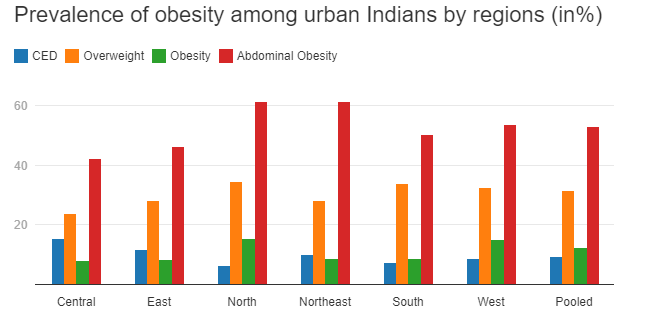Conquer Belly Fat: How Lifestyle, Exercise, and Metabolism Work Together
Statistics in India paint a concerning picture: belly fat is on the rise. This alarming trend can be traced back to several lifestyle shifts. The convenience of processed foods, often laden with sugar, unhealthy fats, and lacking in essential nutrients, has become increasingly popular. Unfortunately, these processed options offer little satiety, leading to overconsumption and weight gain, particularly around the belly.
Furthermore, our modern lives often involve less physical activity compared to previous generations. We spend more time sitting at desks, commuting by car, and glued to screens, all contributing to a decline in calorie expenditure. This lack of movement creates a situation where the body stores excess calories as fat, with belly fat being a prime target. Chronic stress is another significant culprit. When stressed, our bodies release cortisol, a hormone that promotes fat storage, particularly around the abdomen. This can lead to a vicious cycle, as belly fat itself can contribute to increased stress levels.
Lifestyle and Belly Fat
Our daily choices play a major role in belly fat accumulation. Here’s how some common lifestyle habits can contribute:
- Unhealthy Diet:
- Processed foods: Often loaded with calories, sugar, unhealthy fats, and lacking in fiber. This combination can lead to overeating and weight gain, particularly around the belly.
- Sugary drinks: Sodas, sports drinks, and fruit juices are packed with sugar, which contributes to increased calorie intake and fat storage.
- Unhealthy fats: While some fats are essential, excessive saturated and trans fats found in fried foods, processed meats, and bakery items can promote belly fat accumulation.
- Lack of Sleep:
- Disrupts hormones like leptin (satiety hormone) and ghrelin (hunger hormone), leading to increased cravings and potential overeating.
- Sleep deprivation can also impair your body’s ability to regulate blood sugar, further contributing to weight gain.
- Chronic Stress:
- Elevates cortisol levels, a hormone that promotes fat storage, particularly around the belly.
- Stress can also lead to unhealthy coping mechanisms like emotional eating, hindering weight management efforts.
Belly fat can be more challenging to lose compared to other types of fat. This is because:
- Visceral fat, located deep within the abdomen, is metabolically active and releases harmful substances into the body.
- Genetics can play a role in how your body stores fat and the distribution of fat throughout your body.
Consequences Beyond Aesthetics
Belly fat isn’t just about how your clothes fit. It’s a sneaky culprit that can significantly impact your health in various ways. Here’s how excess belly fat can pose a serious threat:
1. Increased risk of chronic diseases
- Heart Disease: Visceral fat releases hormones that can increase inflammation and contribute to plaque buildup in arteries, raising the risk of heart attacks and strokes.
- Type 2 Diabetes: Excess visceral fat can impair insulin sensitivity, making it harder for your body to regulate blood sugar levels, leading to type 2 diabetes.
- Certain Cancers: Studies suggest a link between excess visceral fat and an increased risk of developing some cancers, such as colorectal cancer.
2. Reduced mobility and physical limitations
A large amount of belly fat can restrict movement and make everyday activities like bending, reaching, or climbing stairs more challenging. This can lead to a decrease in overall fitness and independence.
2. Psychological impact
Excessive belly fat can contribute to low self-esteem, body image concerns, and even depression. Feeling uncomfortable in your own skin can affect your social interactions and overall well-being.
Lifestyle Habits for Belly Fat Reduction
A balanced diet rich in fruits, vegetables, whole grains, and lean protein plays a crucial role in belly fat reduction. Fruits and vegetables are rich in fiber, vitamins, and minerals, keeping you feeling full and reducing cravings. Whole grains provide sustained energy and regulate blood sugar levels. Lean protein promotes satiety and helps build muscle, which boosts metabolism.
Limiting processed foods, sugary drinks, and unhealthy fats is equally important. These are loaded with calories and low in nutrients. Reducing them helps to reduce calorie intake, control blood sugar levels, and promote healthy eating habits.
Another crucial factor is quality sleep. Aim for 7-8 hours of sleep each night. When sleep-deprived, your body produces more ghrelin (hunger hormone) and less leptin (satiety hormone), leading to increased cravings and potential weight gain.
Exercise and Belly Fat Loss
Regular physical activity is your key weapon in the fight against belly fat. It works in two powerful ways:
- Calorie Burning: Exercise helps you burn off excess calories consumed throughout the day. The more intense the activity, the more calories you burn. Activities like brisk walking, swimming, cycling, or dancing are all excellent choices for calorie burning.
- Metabolism Boost: Strength training builds muscle mass, which acts like a metabolic furnace. Even at rest, your body burns more calories to maintain this increased muscle. This afterburn effect helps you continue burning calories long after your workout is done.
Finding Your Exercise Groove
The key to sticking with an exercise routine is finding activities you enjoy. Don’t force yourself into activities you dread. Explore different options – try a group fitness class, hit the pool for a swim, or explore your neighborhood with a brisk walk. The important thing is to get your body moving consistently.
The Role of Metabolism in Weight Management
Metabolism is the complex process by which your body takes the food you eat and converts it into usable energy. This energy fuels all your bodily functions, from breathing and digestion to thinking and exercising. A higher metabolic rate means your body burns more calories throughout the day, even at rest. This can be a significant advantage for weight management, as it creates a calorie deficit – burning more calories than you consume – essential for weight loss.
Several factors influence your metabolic rate:
- Basal Metabolic Rate (BMR): This is the number of calories your body burns at rest to maintain basic functions. It accounts for a significant portion of your total daily calorie expenditure. Muscle mass plays a key role in BMR – the more muscle you have, the higher your BMR.
- Age: Unfortunately, metabolism tends to slow down with age. This is partly due to a decrease in muscle mass and partly due to changes in hormones.
- Genetics: Some people are naturally predisposed to have a faster or slower metabolism.
While we can’t control factors like age and genetics, there are ways to potentially support a healthy metabolism:
- Building Muscle: Strength training helps build and maintain muscle mass, which can boost your BMR and increase calorie burning even at rest.
- Regular Exercise: Engaging in regular physical activity, even moderate-intensity exercise like brisk walking, can give your metabolism a temporary boost.
- Healthy Diet: Eating a balanced diet rich in whole foods provides your body with the nutrients it needs to function optimally, potentially supporting healthy metabolic processes.
FD 369- The Metabolism Booster
Maintaining a healthy metabolism is crucial for weight management and overall well-being. During your belly fat reduction journey or workout routine, proper digestion plays a key role in nutrient absorption and energy utilization.
FD-369, an Ayurvedic supplement from The Diet Hub, is formulated with a blend of natural ingredients traditionally used in Ayurveda to support digestion. These ingredients include:
- Flax Seed Oil: Rich in Omega-3 fatty acids and Lignan fibers, which may contribute to healthy cholesterol levels and a feeling of fullness.
- Wheat Germ Oil: Packed with Vitamin E and other nutrients, it may support cellular health.
- Lasuna Oil: Known for its heart-friendly properties in Ayurvedic practices.
- Moringa Oil: A rich source of various beneficial compounds, including Beto-Sitosterol.
FD-369 can be a potential addition to your existing healthy lifestyle and exercise routine.
Conclusion
Conquering belly fat requires a multifaceted approach that addresses lifestyle habits, exercise, and metabolism. As we navigate the challenges of modern living, it’s crucial to prioritize healthy choices that support our well-being. By adopting a balanced diet, engaging in regular exercise, and potentially incorporating supplements like FD-369, we can embark on a transformative journey towards a trimmer waistline and improved overall health. Remember, small changes add up over time, so stay consistent and patient on your path to success.
Ready to take control of your belly fat and embrace a healthier lifestyle? Discover the power of FD-369, our Ayurvedic supplement designed to support digestion and metabolism, and unlock your full potential for a happier, healthier you. Visit our website today and start your journey towards conquering belly fat for good!





